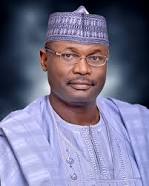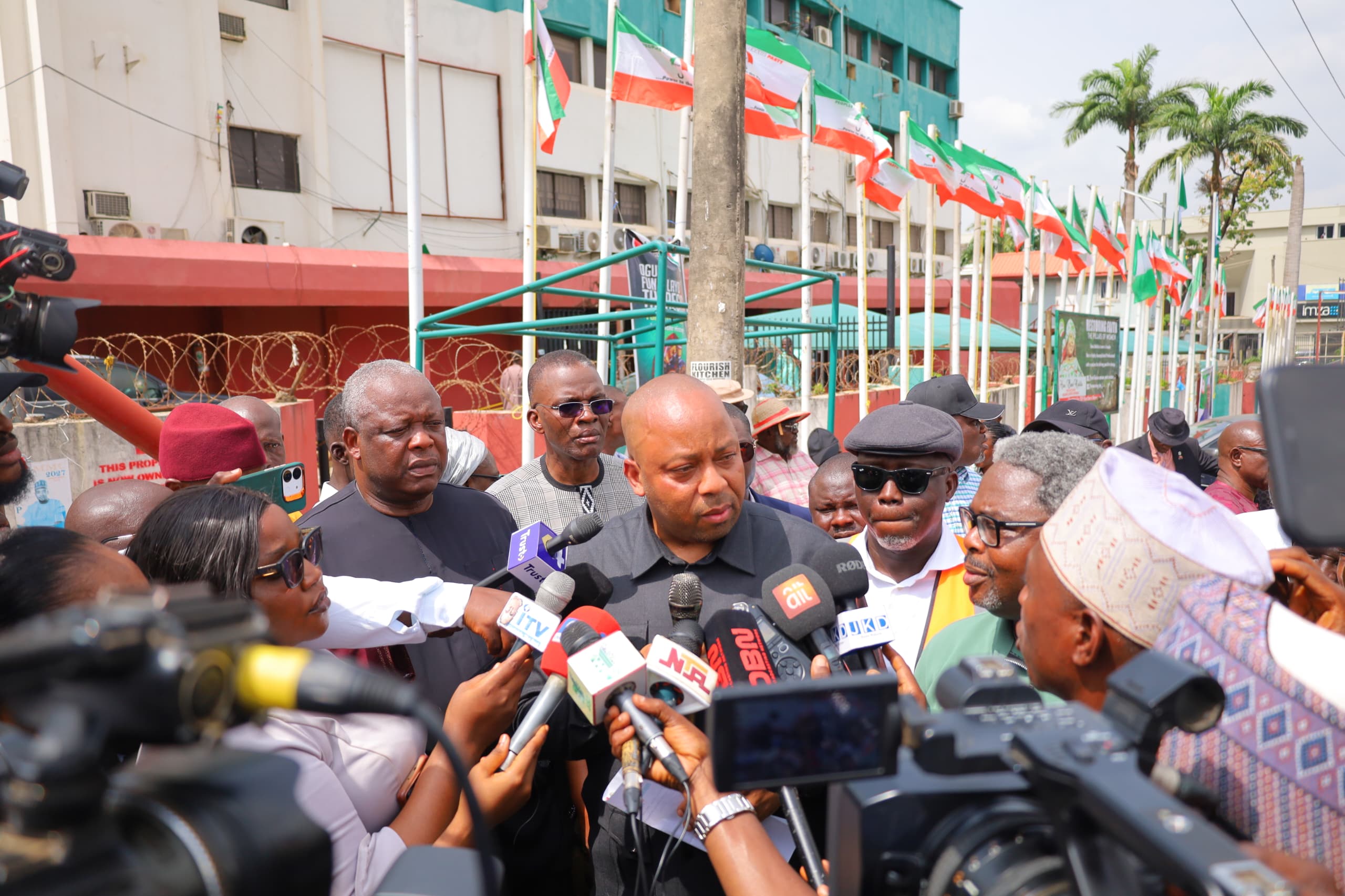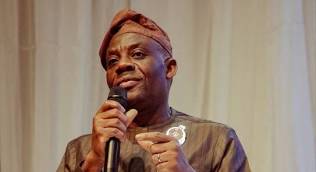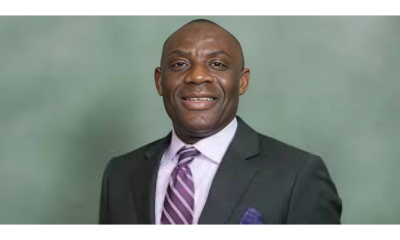COVER
2023: INEC Tasks NASS on Speedy Passage of Electoral Offences Commission Bill

The Independent National Electoral Commission (INEC), said speedy passage of the National Electoral Offences Commission and Tribunal Bill by the National Assembly will checkmate vote buying.
The bill, meant to provide the legal framework for investigation and prosecution of electoral offences for the general improvement of the electoral process in Nigeria, on June 30, passed second reading in the House of Representatives.
The Senate had in July 2021, passed a similar bill, which had seven parts and 48 sections, and sought to take the “burden” of prosecuting electoral offenders off INEC.
INEC Resident Electoral Commissioner (REC) in Lagos State, Mr Olusegun Agbaje, said yesterday that if passed, the bill would ensure speedy trial of electoral offenders.
He said that if electoral offenders, including vote buyers and voter sellers were arrested and quickly prosecuted, there would be more sanity in the 2023 general elections.
Agbaje, however, said that the battle against vote buying in whatever shapes or forms, must be fought to a standstill by all stakeholders in Nigeria.
“There are so many issues to this matter. The judicial aspect is there, security agencies are there. INEC cannot monitor all these offenders.
“There is no way we can be conducting elections and at the same time, watching people that are buying the conscience of voters with money, food or other things.
“That is why the commission has been asking the national assembly regularly to finish its work on the electoral offences commission and tribunal bill to become law.
“When we have this, it will be just like the Economic and Financial Crimes Commission, to monitor and investigate the menace of vote buying and other offences.
“It will be like security agency for INEC. Their job will be purposely for this and they will be all out on Election Day.
“The vote buyers and sellers are giving INEC a bad name, however, it is not the duty of INEC to monitor this,” he said.
Agbaje advised that all stakeholders should engage politicians on vote buying ahead of the 2023 general elections, and talk to them as actors sponsoring and encouraging this menace.
The REC decried the delay in prosecuting electoral offences in Nigeria, describing it as frustrating.
“When we see this kind of thing, we get frustrated. The judiciary also has to do something. What is the court waiting for in some of these electoral offences?
“In fact, in Kenya and other countries , within two hours, an electoral case will be judged.
“If people are jailed for electoral offences, I am sure by 2023, everybody will be careful; but because there is no punishment, people just feel they can do anything.
“So, it is not just between INEC and political parties, judiciary also has a role to play. They must assist us to ensure that whatever case is brought is promptly judged to serve as deterrent ,” the INEC boss said.
According to him, if a case that is simple and can be judged within two weeks is left for three years, and people do not see any action, they feel that if they do it again, nothing will happen to them and that their godfathers will also protect them.
He explained that the security, judiciary, INEC, national assembly, political parties, NGOs and other critical stakeholders had roles to play in fighting vote buying and vote selling.
Agbaje said that it remained an offence for any voter to display his or her ballot after casting vote for anyone to see, saying: “If we have that agency we are talking about, that is their job to position officers to monitor all these.”
The INEC chief added that even before elections, every illegal transfer of money to thousands of voters would be monitored and investigated by the agency.
According to him, INEC will intensify efforts in situating polling booths in such a way that it will not allow voters to display their ballot paper after voting to vote buyers, so as to get paid for voting their party.
He, however, pointed out that in the 2023 general elections, INEC would discuss with members of the Inter Agency Consultative Committee on Election Security (ICCES) on ways to fight the menace.
Agbaje, however, urged Nigerians and politicians to change their orientation about elections, saying in countries like Republic of Ireland, elections were not monitored by policemen or party agents at the polling booths on Election Day.
He said that with the Bimodal Voter Accreditation System (BVAS), the 2023 elections will be better and more credible, adding that votes would count in Lagos.
INEC Tasks Parties on Credible Agents, Says Votes’ll Count in 2023
In a related development the Commission has urged political parties to engage credible and trained party agents, assuring that votes would count in the 2023 general elections.
The INEC Resident Electoral Commissioner (REC) in Lagos state, Mr Olusegun Agbaje said that the commission was not carried away by the euphoria of success recorded in the recent Ekiti and Osun elections, but rather working hard to deliver best elections in the state in 2023.
According to Agbaje, the same commission under the leadership of Prof. Mahmood Yakubu that conducted some of the off circle elections Nigerians are proud of, will also offer best elections in 2023.
According to him, “It is important to also realise that INEC only conducts elections, INEC do not vote.
“It is the votes of the electorate that will be counted. All INEC does is to monitor the election.
“What we have seen now is better elections but we are looking for the best, and we assure Nigerians that by the Grace of God, with all the things that the commission has put in place, 2023 elections will be the best the country has ever had.
“In Lagos state, with the way we have been carrying along our political party leaders, various NGOs, CSOs and other groups in the state, even the media, we will deliver best elections.
“If every party has good party agents that will be at various polling units, I don’t see any reason why election results will be tampered with.”
He urged the stakeholders to always notify INEC if they observed anything capable of jeopardizing credible elections, saying the commission had vowed to give a level playing ground to all political parties and candidates in elections without interference.
“If you see things that are not proper and things that are not well done, bring our attention to it so that we can immediately do something and not wait until havoc has been done.
“All of us have roles to play including security agencies, and if all of us play our roles well the way it was played in the Osun election recently, definitely, we should expect to have the best elections than we have ever had in the country next year,” he said.
On election security, the REC said that the commission had a very good and robust partnership arrangement with security agencies under the aegis of Inter-Agency Consultative Committee on Election Security (ICCES).
“We have decided that we are going to inaugurate it in Lagos state in October. By the time we start, it is going to be straight to election,” he added. (NAN)
COVER
Dangote Beats MTN, DSTV, AZAM to Emerge as Most Admired African Brand

By David Torough, Abuja
It was another historic milestone for pan-African investor Aliko Dangote and the Dangote Industries Limited over the weekend, as they garnered three prestigious accolades at the 15th annual Brand Africa 100 awards, held at the iconic Africa Hall in Addis Ababa, Ethiopia—the birthplace of the Organisation of African Unity (OAU), now the African Union (AU).
Dangote Industries Limited was named Most Admired African Brand, following an independent, consumer-led survey conducted across more than 30 African countries. The company was also inducted into the Brand Africa Hall of Fame, becoming the first African firm to receive this distinction. The induction recognises Dangote’s transformative impact on African consumers and its influential role in shaping a positive narrative for the continent.President/Chief Executive, Dangote Industries Limited, Aliko Dangote was honoured with a Lifetime Achievement Award in recognition of his leadership in driving impactful industrialisation, establishing a world-class African brand and reshaping the continent’s economic future through a benchmark, homegrown enterprise.Joining Dangote Industries in the inaugural Hall of Fame were MTN, M-Pesa, Ethiopian Airlines, and South Africa, for consistently ranking among Africa’s most admired brands over the past 5 to 15 years and for building sustainable, globally respected brands.Reacting to the awards, Group Chief Branding & Communications Officer, Dangote Industries Limited, Anthony Chiejina, said the honours reflect the unwavering commitment, excellence, and innovation that define the group’s journey. He added that they are a testament to the dedication of the company’s outstanding team, partners, and stakeholders, who continue to believe in the mission to drive sustainable development and economic growth across the continent.”We also extend our heartfelt appreciation for the Lifetime Achievement Award presented to our Founder and President, Aliko Dangote for building a purposeful world-class industrial brand that has exceptionally transformed African lives and the African narrative. This accolade celebrates not only his visionary leadership but also his tireless efforts in transforming industries, creating opportunities, and championing African enterprise on the global stage. His legacy is an inspiration to generations of entrepreneurs and leaders across Africa,” he said.Noting that the recognition would further inspire the company to push boundaries, empower communities, and deliver meaningful value across Africa and beyond, Chiejina reaffirmed Dangote Industries’ commitment to excellence, integrity, and transformative growth.In his keynote address, United Nations Under-Secretary-General and Executive Secretary of the Economic Commission for Africa, Mr Claver Gatete, praised Aliko Dangote, the Hall of Fame inductees, and the Brand Africa laureates for advancing the African agenda.He highlighted the alignment between Brand Africa and the ECA’s mission to promote inclusive industrialisation, regional integration, and private sector-led growth. He also called for increased investment in youth-led innovation, regional value chains and the establishment of a Pan-African Creative Innovation Fund to identify, finance and globalise Africa’s most promising brands.”I wish to particularly acknowledge MTN, Dangote Group, mPesa and Ethiopian Airlines for consistently maintaining their distinguished positions among the “Most Admired African Brands” category and continuing to set benchmarks in brand leadership, innovation and continental impact,” he said.COVER
Land Revocation: FCTA Seals PDP Secretariat, FIRS, Access Bank, Others

By Johnson Eyiangho and Laide Akinboade Anima, Abuja
A team from the Federal Capital Territory Administration (FCTA) on Monday sealed the Peoples Democratic Party (PDP) national secretariat, Wuse Zone 5, Abuja.The sealing of the PDP secretariat came barely 24 hours to the much anticipated meeting of the party’s National Executive Committee (NEC) scheduled for Tuesday.
The national secretariat also serves as the venue to the PDP NEC meeting. A joint taskforce comprising officials from the FCTA, Police, DSS, Army, NDLEA and NSCDC stormed the Secretariat at about 2.04pm and sealed the office shortly after a crucial meeting of the PDP National Working Committee (NWC).However, after a briefing meeting between the FCTA and PDP officials, all cars parked in the premises of the Secretariat were allowed to move out, while the PDP’s officials rushed to Bauchi State Governor’s Lodge for the Caucus meeting of the party.The sealing of the Secretariat is widely perceived as a strategic escalation in Wike’s ongoing feud with leadership of the party, particularly those pushing for the removal of his lackey, Senator Samuel Nnaemeka Anyanwu, as National Secretary of the party.Meanwhile, the National Working Committee (NWC) of the PDP has vowed that the National Executive Committee (NEC) meeting slated for Tuesday May 27, 2025 will be held as scheduled.A party official who did not want to be named described the sealing of the Secretariat as a temporary setback, vowing that all party activities leading to NEC and beyond will continue.The National Caucus Meeting, Board of Trustees and Governors meetings are part of activities ahead of the NEC meeting.The FCT Minister had revoked over 4,700 properties due to long-standing non-payment of ground rent to the Federal Capital Territory Administration (FCTA).Also affected by the Monday exercise are Access Bank, the Federal Inland Revenue Service (FIRS), Ibro Hotel and Total Energy in Abuja.The enforcement, which began in the Wuse District, was led by FCT Minister’s Senior Special Assistant on Public Communications and Social Media, Lere Olayinka, Director of Land Administration, Chijioke Nwankwoeze and Director Department of Development Control, Mukhtar Galadima.Speaking during the sealing of Plot 534, Cadastral Zone A02, Wuse Zone 1, belonging to Total PLC, Galadima said, “Today is about walking the talk. We announced this earlier, and we are here to implement what we said to take possession of all revoked properties, starting with this plot.”He noted that the Total PLC property had accumulated over 10 years of unpaid ground rent, leading to its revocation in March 2025.Also sealed was the Access Bank branch located on Plot 2456, Wuse 1, Cadastral Zone A02. The property, however, belongs to Rana Taher Furniture Nigeria Limited and was revoked due to 34 years of unpaid ground rent.Galadima said the enforcement would proceed to other parts of the city, including the Central Area, after the Wuse district.Tinubu Intervenes, Gives 14-days GracePresident Bola Tinubu has intervened on the ongoing enforcement of possession of 4,794 properties revoked for non-payment of ground rent from 10 to 43 years and has given them 14 days ultimatum to pay up.This was revealed at a briefing by the Director of Land Administration, Chijioke Nwankwoeze, in Abuja.He said the defaulters have been given 14 days to pay up all outstanding and the penalty fees.The Director of Land noted that even though properties owned by government institutions, corporate organisations and individuals were affected, the Administration is committed to carrying out its functions without fear or favour.He said, “However, the President, His Excellency Bola Ahmed Tinubu, GCFR, has intervened. Therefore, by Mr. President’s intervention, holders of the affected properties now have 14 days (TWO WEEKS) to settle the outstanding Ground Rents, with associated penalties.”For properties in the Central Area, the sum of N5 million will be paid by the defaulters as penalty, in addition to the Ground Rent owed.”Those in Maitama, Asokoro, Wuse II, and Guzape Districts will pay the sum of N3 million as penalty, in addition to the Ground Rent owed.”Defaulters in Wuse I, Garki I and Garki II will pay N2 million as penalty in addition to the Ground Rent owed”.He added, “Also, all those who purchased properties from other people, but are yet to register their interests by obtaining the mandatory Minister’s Consent and registering their Deeds of Assignment now have 14 days (TWO WEEKS) to do so at the FCT Department of Land Administration.”Furthermore, the Minister of the Federal Capital Territory (FCT), Barrister Nyesom Ezenwo Wike, CON, has granted a 14 days (TWO WEEKS) grace period to all property holders in the FCT to pay up their Right of Occupancy (R-of-O)/Certificate of Occupancy (C-of-O) bills, or risk revocation of those titles”.The FCT Minister therefore urged property owners in the FCT to ensure that they pay all necessary bills and charges on their properties as at and when due, so as to enable the government to continue to carry out necessary developmental projects for the benefit of the people.COVER
Herdsmen Attack again, Kill 42, Sack Benue Four Communities

From Attah Ede, Makurdi, Joseph Amedu, Lokoja
Over 42 persons have been reportedly killed, with seven others badly injured and two persons kidnapped in the latest attacks on four communities in Gwer west Local Government Area (LGA) of Benue State.It was gathered that most residents have fled their communities as the attacks have become a daily occurrence.
According to a local source, while over 20 persons were killed in Aondona community, seven others were killed in Ahume, five in Tyolaha along with six persons killed in Orbiam community and two others kidnapped near a military base in the local government area respectively. The source further said that the armed Fulani herders first attacked Aondona town on Sunday at about 4pm and continued yesterday at Ahume and a Military Base at Orbiam and Tyolaha.”I can categorically confirm to you that 20 persons were killed in Aondona, five in Tyolaha, seven killed in Ahume and 6 others were killed in Orbiam at the Military Base which is just three Kilometers away from Naka town, while seven people were injured with two others kidnapped.”The local government council in collaboration with stakeholders in Nagi set up a search and rescue operation team. So far, the search and rescue team has recovered six corpses this morning (Monday), while the injured ones have been evacuated to general hospital Naka for medical attention.”As I speak with you, our people have fled all the communities in the affected areas. The whole communities have been deserted and taken over by herders. We can no longer go to farms, children have stopped going to school, while markets and churches have been shutdown due to the activities of these Fulani terrorists occupying communities. Government must do something, they must act fast to stop these incessant killings in Benue State particularly in Gwer-West”, the source said.The Chairman of Gwer-West Local Government Council, Victor Ormin confirmed the incident, saying that the killing was still on as over 42 people have been killed so far.He described it as a “Pathetic situation”, revealing that recovery of corpses is still ongoing and over 30 dead bodies have been recovered so far between Sunday and Monday(yesterday).According to him, when he confronted the military on why they are adamant to engage the armed herders, the military personnel told him they were yet to receive a directive from higher authorities to engage them.”Only yesterday, I buried five people, fathers of children and when I confronted the military to engage the killers of my people, they told me that they are waiting for a directive from higher authorities.”So, until my people are all killed before the federal government would give directives to military personnel before engaging these people.”They are claiming that they don’t have the mandate to engage these people, that it is only the federal government that can give them the mandate to engage these people. So, my people should be killed, dead all before the federal government would talk about it; what is the meaning of this?”Yesterday I buried a father and two of his children over 40 to 50 years of age in Tse- Orbiam, very close to a military base. What is the meaning of this? Now we are talking about 40 or more people. This is genocide.”If they cannot help me, maybe I will leave this chairman seat and let it continue the way it is. I don’t care about being a chairman of a people that are all killed. Look at a child of two years old butch with cutlasses.”More than 20 people were killed in Aondona village. This is a village of the former first lady of this state, Eunice Ortom. This is the village of Tor Gwer, this is the village of Bishop of Makurdi catholic diocese Bishop Anagbe. This is talking too much to condole and I can tell you, whatever will happen, will happen. Thank you”.”We are not saying that the military is incompetent, the soldiers are waiting for the orders and the mandate to do what they have to do which have not been given.A Mobile police man, identified as Magaji, was killed yesterday. He has dedicated his whole life to service, he is always at that junction along Naka road whether he has bullets or not. Yesterday when they came, they said he finished his ammunition and was scouting for people to leave and Magaji was killed yesterday. This is genocide.As of press time, the Benue State Police Command was yet to confirm the ugly development in Gwer-West Local Government Area. All efforts to get confirmation from the command’s police public relations officer, Catherine Anene was unsuccessful as she could not respond to text or calls.Kogi Auto-Crash Claims 19, Injures EightThe Federal Road Safety Corps (FRSC) on Monday confirmed that no fewer than 19 persons died and eight others injured in an auto crash which occurred on Sunday along Lokoja-Obajana road.State Sector Commander of the corps, Kumar Tsukwam confirmed this to DAILY ASSET in Lokoja on Monday.Tsukwam said that some of the survivors sustained bruises, cuts, dislocations, fractures, and fire burns.He said that the fatal accident occurred at Gadabiu community along the Lokoja-Obajana road in Lokoja Local Government Area of the state around 4pm on Sunday.He revealed that among the 19 burnt to death, were five children.According to him, the fatal and very sad accident involved an articulated vehicle (Truck) and a Toyota Hummer Bus heading to Abuja from the South.He said that it was a head-on collision when the bus on high speed tried to overtake an articulated vehicle only to face an incoming articulated vehicle with no option.“It was very unfortunate, because it was caused by speeding and wrongful overtaking and involved 27 persons with only eight survivors.“Our rescue operation team and the police were able to rescue the eight survivors and rushed them to Fisayo Hospital, Obajana for immediate medical attention.The commander said that the highways were not race roads and appealed to motorists to avoid speed and wrongful overtaking.He also tasked motorists to always keep to traffic rules and regulations to help the corps and the federal government in reducing road traffic crashes and carnage on roads across the country.




























